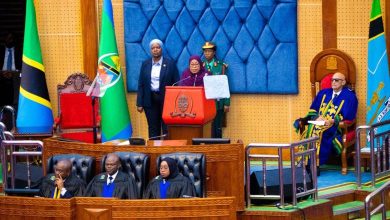Tanzania reputation strong amid shifting geopolitics

DAR ES SALAAM: AS shifting geopolitics redraw alliances and re-shape global priorities, Tanzania has retained a strong international reputation, balancing foreign policy pragmatism with steady domestic progress.
This positioning reflects the country’s ability to maintain credibility and influence in both regional and global arenas, despite evolving challenges.
This stance contrasts with a recent article in an English language newspaper in Tanzania, which suggested that the country’s gradual efforts to assert itself as a global player are paradoxically, eroding its influence.
The author relied on five yardsticks to support this claim, including the relocation of some UN offices to Nairobi, Kenya, as an indicator of Tanzania’s purported decline.
As an analyst specialising in economic, investment and international affairs, I recently examined the UN@80 reform agenda under Secretary General António Guterres. The analysis focused on how the organisation is reshaping operations worldwide to improve efficiency and effectiveness.
A key aspect of this examination was understanding why Nairobi emerged as a hub for relocating certain UN offices and what implications this might have for Tanzania’s own plans to host similar entities.
Arusha’s past experience hosting UN offices demonstrates Tanzania’s capability to accommodate such institutions, underscoring that the relocation does not reflect a deficiency in Tanzanian capacity or ambition.
During a discussion on The Focus on This Week, a programme aired by TBC, Susan Ngongi Namondo, the UN Resident Coordinator in Tanzania, explained the criteria behind Nairobi’s selection.
Her insights show that the decision was based on operational and logistical considerations rather than any decline in Tanzania’s international standing.
This clarification directly challenges the notion that Tanzania is losing influence, demonstrating instead that external decisions often reflect broader organisational priorities rather than the host country’s limitations.
This discussion also intersects with broader perceptions of Tanzania’s international engagement, including the return of Tanzanian troops from the DRC.
While respecting the author’s right to free expression, it is important to critically examine the five arguments advanced in critiquing Tanzania’s conduct in international affairs.
Although I cannot speak to the methodology’s others use in interpreting data, a review of the Bank of Tanzania’s monthly economic reports, National Bureau of Statistics publications and budget speeches presents a more compelling and evidence-based narrative.
Between 2022 and 2024, Tanzania experienced a notable increase in foreign investment inflows, driven by improved policy stability, regulatory reforms and strategic infrastructure development.
Prominent sectors, including mining, energy, agribusiness and manufacturing have attracted sustained interest from international investors.
ALSO READ: Tanzania’s global reputation remains strong amid shifting geopolitics
These efforts have been bolstered by initiatives to streamline investment processes through institutions such as the Tanzania Investment Centre (TIC).
The resulting investments have facilitated job creation, technology transfer and export diversification, all of which contribute directly to the country’s long-term development objectives outlined in Development Vision 2050 (DV2050).
Human capital development, another area critiqued by the article, has also seen measurable progress. Between 2022 and 2024, government investment in education has enhanced productivity across public and private sectors.
Initiatives include broadening access to technical and vocational education, improving teacher training standards and integrating information and communication technology into schools.
STEM education has been prioritised to ensure that workforce skills align with market demands.
These efforts are yielding tangible results, improving workforce readiness, institutional efficiency, innovation and overall competitiveness.
Tanzania’s improvements in logistics further reinforce its growing influence in the region.
The acquisition of a new fleet by Air Tanzania Company (ATC) has significantly enhanced domestic and regional air connectivity, including direct flights to Nigeria and plans to extend services to Ghana and other international destinations.
The gradual implementation of the electric Standard Gauge Railway (SGR) has improved cargo transport from Dar es Salaam Port to landlocked nations such as Rwanda, Uganda and the DRC.
Simultaneously, advances in port efficiency, including digitised clearance systems and increased handling capacity, have reduced turnaround times and boosted throughput.
Collectively, these initiatives position the country as a key logistics hub, strengthening trade competitiveness and regional economic ties.
Throughout this period, the country has also demonstrated progress in governance and policy consistency.
By prioritising transparency, regulatory reform and streamlined investment processes, the country has created an environment conducive to economic growth.
These developments directly counter the argument that the country is failing to seize international opportunities, showing instead that the nation is systematically strengthening its global standing.
The country’s efforts are aligned with Dira 2050, which sets ambitious targets: Achieving a one-trillion US dollars economy by 2050, with the industrial sector contributing 40 per cent to GDP, annual economic growth of 8–10 per cent, a 50 per cent increase in formal employment, 25 per cent higher education attainment and per capita electricity consumption of 3,000 kWh.
Initiatives such as promoting Swahili as a UN language and enhancing regional and international cooperation further reinforce Tanzania’s influence and visibility on the global stage.
In conclusion, while some narratives may suggest that Tanzania is losing prominence, evidence from economic performance, education and human capital development, strategic infrastructure investment and regional engagement indicates otherwise.
The country continues to consolidate its domestic foundations while projecting a credible, capable presence internationally.
Tanzania’s global reputation remains robust, reflecting deliberate policy choices, sustained development progress and a strategic approach to international engagement.





